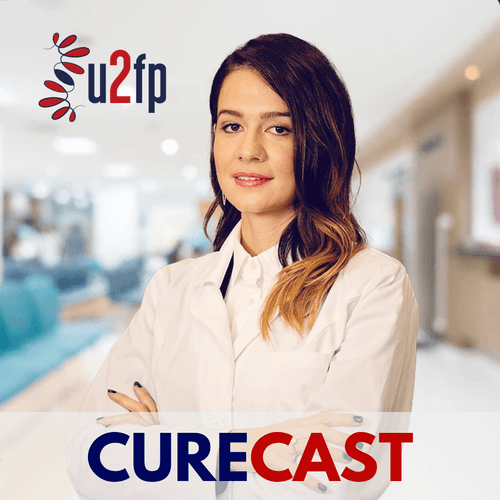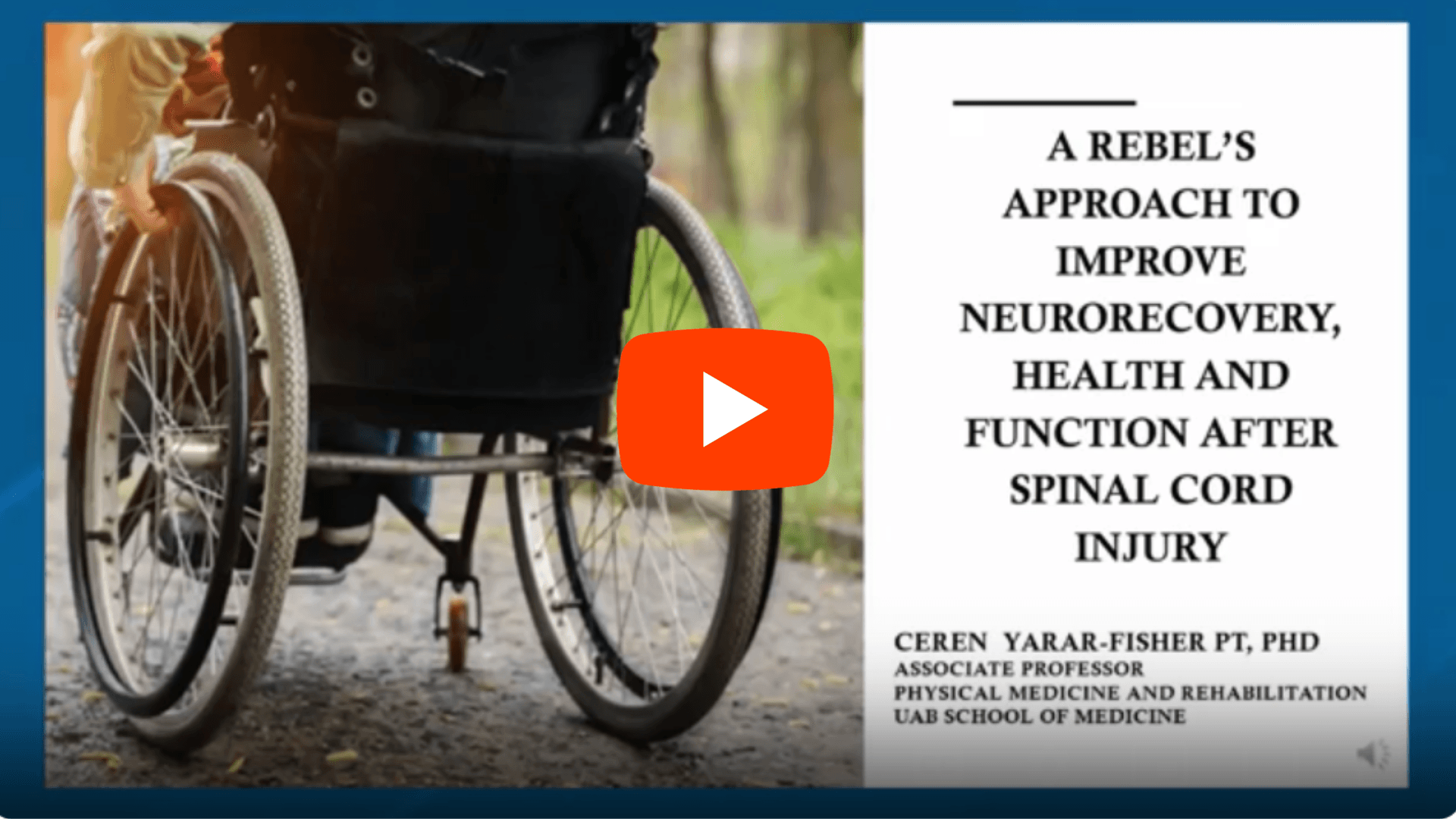You Are What You Eat (Episode 91)

Guest: Ceren Yarar-Fisher
Today we’re talking with Ceren Yarar-Fisher, PhD, PT. Dr. Yarar-Fisher is Vice Chair of Research of Physical Medicine and Rehabilitation in the Dept. of Neuroscience at The Ohio State University. She’s also the director of clinical research at the Belford Center for Spinal Cord Injury. In this episode, we start off exploring the unique origins of Ceren’s interest in science and later spinal cord injury. We also talk about her research interest in SCI functional recovery through rehabilitation and nutrition, her role at the multi-disciplinary Belford Center and this year’s inaugural SCI Days at OSU. Ceren’s passion for her work and the creativity that fosters her research questions are evident throughout this discussion.
As always, please share your thoughts with us via email at curecast@u2fp.org. Thanks for listening!
Listen on: Spotify | Apple Podcasts | Soundcloud
Bumper music: Dig a Hole by Freaque
Guest Bio
Ceren Yarar-Fisher, PhD, PT, is an Associate Professor and Vice Chair of Research at the Ohio State University Department of Physical Medicine and Rehabilitation and Director of Clinical Research at the Belford Center for Spinal Cord Injury. Her translational research program focuses on understanding the pathophysiology of traumatic spinal cord injury in the acute and chronic stages with the purpose of developing novel dietary and rehabilitation strategies to improve neuro-recovery, metabolism, and bowel function. Thus, her laboratory is currently developing and testing therapeutic diets and electrical stimulation programs to evaluate new ways to prevent neuronal death, promote recovery and function in the acute stages and improve body composition, gut microbiome composition, and skeletal muscle and metabolic health in the chronic stages of SCI. She has received several NIH and NIDILRR funding to support her investigations in SCI. She was selected as one of the 10 Outstanding Young Persons of Turkey by Junior Chamber International for her work in Academic leadership and accomplishment. She served two years as Treasurer, Chair-Elect, and Chair in American Congress of Rehabilitation Medicine (ACRM) SCI-Special Interest Group, and is a member of ACRM, Academy of Spinal Cord Injury Professionals, American College of Sports Medicine and American Physiological Society. Throughout her career, Dr. Yarar-Fisher has devoted time to support the critical peer-review process, serving as an editorial board member of a prestigious SCI journal, an active manuscript reviewer for several peer-reviewed journals, abstract reviewer for prestigious organizations including the ACRM, and ad-hoc reviewer for the various NIH, DOD, NIDILRR study sections.
- Twitter: @DrYararFisher
- Research website: https://www.pro-sci.science/
More Resources
Watch Dr. Yarar-Fisher's presentation from our 2021 Science & Advocacy Symposium, "A Rebel’s Approach to Improve Neurorecovery and Function after SCI."
You can also watch her in a panel discussion and question and answer session immediately following her presentation (1:03:13) with the following researchers: Ann Van de Winckel, PhD, MSPT, PT (University of Minnesota); J. Andrew Taylor, PhD (Harvard Medical School); Ceren Yarar-Fisher, PT, PhD (University of Alabama - Birmingham); Christel Mitrovitch, MS (U2FP Board of Directors - Moderator).
Presentation Abstract
Title: A REBEL’S APPROACH TO IMPROVE NEURORECOVERY AND FUNCTION AFTER SPINAL CORD INJURY (SCI)
Team members: Ceren Yarar-Fisher PT, PhD; Erika Womack PhD; Jia Li PhD, Jan Jansen, MD; Stephen Barnes, PhD; Casey Morrow, PhD; Cassandra Renfro, MD; Kelly Berg, RD, and The Center for Injury Science Research Assistance Program
Funding Sources: NIH/NINR (R01) and NIH NCATS (KL2)
Links to publications: PMID: 30275980, 32366293, 33445134
Area of SCI Inquiry: Adjuvant therapies to improve neurorecovery and function in traumatic SCI.
The treatment of SCI is limited, and patients are left with few options. To date, no pharmacologic therapy has demonstrated significant improvement effects in the neurological recovery of SCI patients. Metabolic manipulation via novel diets has long been used in treating epilepsy and is increasingly being evaluated in clinical trials for a range of neurodegenerative diseases, such as Parkinson’s and Alzheimer’s disease, with promising results. However, diet-based treatments have only recently been applied to experimental SCI. A better understanding of the impact of nutritional interventions in the acute stages of SCI may lead to improved outcomes and lessen the severity of the injury.
The ketogenic diet (KD), offer effective neuroprotection against secondary injury cascades and improve forelimb motor function in a rat model of SCI and improve upper extremity motor function in patients with acute SCI. These provocative findings have led us to conduct a controlled randomized trial for determining the safety of KD in people with acute SCI, the effectiveness of KD in improving neurological recovery and functional independence in people with acute SCI, and the reproducibility of KD intervention. This study is ongoing, and our preliminary results suggest that a KD may have anti-inflammatory effects that may promote neuroprotection, resulting in improved neurological recovery in SCI.
Dietary modification, although perhaps more mundane than stem-cell research, advanced genetic manipulations, and complex electrical implants, would be the most translatable and cost-efficient, and likely the safest, approach available for treating SCI.
Acknowledgments
-
This podcast is made possible by a grant from the Christopher & Dana Reeve Foundation’s National Paralysis Resource Center. The information provided and opinions expressed in these podcasts do not necessarily reflect the views of the Christopher & Dana Reeve Foundation. For more information about the Foundation’s National Paralysis Resource Center visit https://www.christopherreeve.org/living-with-paralysis



















